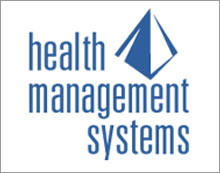Cut health-care waste, boost your portfolioHMS Holdings helps government programs recover medical payments they didn't have to make. It's a growing niche, and analysts say the stock's a buy.(Fortune) -- Sick of hearing about waste, high costs and inefficiencies in government health-care programs? If so, you may want to take a look at adding HMS Holdings (Charts), a New York City-based health-care consulting firm, to your portfolio. HMS helps state health-care programs, including its largest client Medicaid, recover medical payments that they didn't have to make. Say you have no health insurance, are divorced, and your child falls ill. You take your child to the emergency room, and the hospital bills Medicaid. But your former spouse may have insurance that covers the child, meaning Medicaid has been erroneously charged.
Here's where HMS steps in: The firm uses its proprietary software to run Social Security numbers to see whether patients who used state health-care services were already covered by a different insurer. On the flip side, HMS also makes sure that hospitals are getting the correct reimbursement from Medicare. "It has saved the state money and recovered more dollars," says Charles Strauzer, an analyst with CJS Securities. These niches have paid off for HMS, which has posted 17% annual revenue growth on average over the past four years. Its most recent quarterly revenue for the period ending Sept. 30 came in at $21.1 million, an increase of $3.7 million or 21 percent, year-on-year. Its annual revenue for 2005 was $60 million, up 16 percent year-on-year. Analysts agree that the company is on track to grow its top line by 15 percent and earnings by about 30 percent for the next several quarters. "Medicaid is growing at around 8 percent a year, and that's going to drive business. Plus, sales growth has practically been mandated by the government," says Jamie Cuellar, a senior portfolio manager at Brazos Capital Management, which owns HMS stock. The prescription-drug benefit plan enacted this summer, Medicare Part D, will be good for HMS, Cuellar says, if for no other reason than because it's a federally sponsored plan. The government will likely want to hire a company like HMS to make sure it's not paying money it doesn't have to. "The GAO (Government Accounting Office) released a report saying that states must do something about billing errors that are costing them millions of dollars," he says. "This gives the states license to hire a company like HMS to recover the money." Indeed, Florida has outsourced the entire job to HMS, says Strauzer, the CJS Securities analyst. HMS's technology has proven much more efficient than government employees who must go through patient records and contact insurance companies to look for overlap, the case in most states. Revenue from HMS's Medicaid cost containment and benefit coordination unit alone hit $18.1 million in the third quarter ending Sept. 30, up 36 percent from the previous year. To date that division, called Health Management Systems, has recovered more than $6.5 billion for state programs, which also include Medicaid managed-care plans, child-support agencies and state prescription-drug plans. Buying the competition Another plus for HMS's business outlook: It recently bought its main rival - Benefits Solutions Practice Area (BSPA), a consultancy that specializes in helping health-care payers become more efficient - from Public Consulting Group, a Boston-based health-care consulting group. The deal brings together the two largest players in the government health-care revenue recovery space and adds two large clients - the Veterans Administration and Centers for Medicare and Medicaid Services (CMS) - to HMS's roster. The two firms are very complementary, says Whit Mayo, an analyst with Stephens Inc. "HMS is traditionally viewed as savvy from a technological standpoint. BSPA is a carve-out from Deloitte & Touche, so its culture is founded on consultative strategies," he says. "Technological superiority and client relationships are a great recipe, so the company's biggest challenge is integrating two sides that were long-time competitors." Even with the acquisition, though, HMS does not have a monopoly, Mayo says. "They took out the competitor with the most presence, but it's a very fragmented industry full of smaller players," he says, estimating that a competitor would have to be willing to lose $20 million a year just to acquire the technology necessary to compete at same level as HMS. "The most meaningful competitors [to HMS] are the states themselves, since many of them coordinate these services internally," he adds. Even in many states that aren't using HMS as their primary cost-containment manager, they may be using the company as a backup, or safety net, says Cuellar. And as managed care programs expand, more states will turn to HMS, he says. Stock diagnosis HMS stock, currently trading around $14, has slid a bit since hitting a one-year high near $16 in November. That's partly because of a tough third quarter, when the company reported earnings of just 2 cents a share, down from 16 cents a share in the previous year, due to the BSPA acquisition. Still, earnings before interest, taxes, depreciation and amortization, and share-based compensation expense were $4.6 million, an increase of 13.1 percent over the same period in 2005. And the stock is up about 80 percent since the beginning of the year. Wall Street expects it to go even higher: Analysts that cover the stock give it a mean price target of $18.25. Investors may find HMS's price-to-earnings ratio, which is hovering near 37, hard to swallow, given that the average P/E of the S&P 500 is 21. But HMS looks like one of those rare stocks with the organic growth to justify such a high number. After all, the company has posted consistent, measured growth and positioned itself as the dominant player in a market that is bound to expand. That is, unless state health-care plans suddenly transform themselves into technologically advanced, well-run temples of efficiency. |
Sponsors
|

